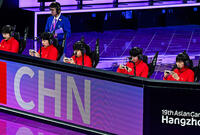This video is also available on the USCI YouTube Channel.
Click on the play button above to view the film.
Other films from the Global Exchange Program 2008:
"Flip and Move" by Kristina Thomas and Zhiwei Liang
"Lessons of America" by Wen Jing
"Lost Angels" by Liu Chang and Junior C/S
"Underwater Neverland" by Ren Ziming and Steven Deichen
Click here to return to the Global Exchange Program 2008 main page.



